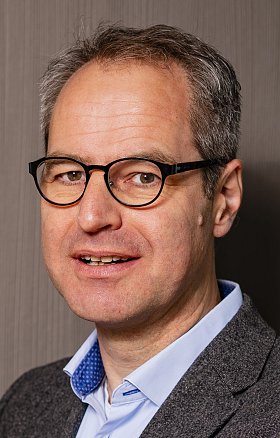Full Professor
Strategic program(s):
Biography
Arjen Slooter studied Medicine at the Vrije Universiteit, Amsterdam and worked subsequently as a resident in Neurology in Sint Lucas Hospital, Amsterdam (1994). He was research fellow in Neuro-Epidemiology at the G.H. Sergievsky Center, Columbia University, New York (1996), and received a PhD in Epidemiology from Erasmus University, Rotterdam (1998), on a thesis on dementia. During his residency in Neurology at UMC Utrecht (1999-2004), he became enthusiastic for Neurocritical Care. After a fellowship in Intensive Care Medicine (AMC Amsterdam, 2004-2006), he rejoined UMC Utrecht where he worked until 2022 as a consultant neurologist-intensivist at the Department of Intensive Care Medicine. In 2016, he was appointed as Professor of Intensive Care Neuropsychiatry at Utrecht University. Dr Slooter was chair of the delirium section of the (American) Society of Critical Care Medicine (SCCM) guidelines on pain, agitation/sedation, delirium, immobility, and sleep disruption, as well as initiator and chair of an international consortium to update nomenclature on delirium and acute encephalopathy. From 2018 to 2023 he was President of the European Delirium Association. In 2022, he made a career shift to psychiatry.
The research focus of Arjen Slooter is on delirium and on neuropsychiatric outcome after anesthesia/surgery or critical illness. Using various methods and approaches (epidemiology, EEG, MRI), he has investigated all aspects of delirium, including its phenomenology and brain network characteristics, detection and monitoring, risk factors, prognosis, prevention and treatment. Research on neuropsychiatric outcomes includes ICU-related risk factor analyses on cognitive decline, mental illness and chronic pain after critical illness and treatment in the ICU. Arjen lives with his wife Barbara, daughter Pien and son Bas in beautiful Utrecht.
1. Van den Boogaard M, Slooter AJC, Brüggemann RJM, Schoonhoven L, Beishuizen A, Vermeijden JW, Pretorius D, de Koning J, Simons KS, Dennesen PJW, Van der Voort PHJ, Houterman S, van der Hoeven JG, Pickkers P; REDUCE Study Investigators. Effect of Haloperidol on Survival Among Critically Ill Adults With a High Risk of Delirium: The REDUCE Randomized Clinical Trial. JAMA 2018;319:680-90. Impact Factor (IF) 157.
2. Numan T, van den Boogaard M, Kamper AM, Rood PJT, Peelen LM, Slooter AJC; Dutch Delirium Detection Study Group. Delirium detection using relative delta power based on 1-minute single-channel EEG: a multicentre study. Br J Anaesth 2019;122:60-8. IF 9.9.
3. Slooter AJC, Otte WM, Devlin JW, Arora RC, Bleck TP, Claassen J, Duprey MS, Ely EW, Kaplan PW, Latronico N, Morandi A, Neufeld KJ, Sharshar T, MacLullich AMJ, Stevens RD. Updated nomenclature of delirium and acute encephalopathy: statement of ten societies. Intensive Care Med 2020;46:1020-2. IF 42.
4. Wilson JE, Mart M, Cunningham C, Shehabi Y, Girard T, MacLullich A, Slooter AJC, EW Ely. Delirium. Nature Rev Dis Primers 2020;6:90. IF 52.
5. Duprey MS, Dijkstra-Kersten SMA, Zaal IJ, Briesacher BA, Saczynski JS, Griffith JL, Devlin JW, Slooter AJC. Opioid Use Increases the Risk of Delirium in Critically Ill Adults Independently of Pain. Am J Respir Crit Care Med 2021;204:566-72. IF 30.5.
Research aim
The general aim of our research group is to decrease the burden of delirium during hospital admission and to improve outcome thereafter. Delirium is a frequent and serious complication that increases the risk of dementia.
Go to group‘Prothrombotic conditions, oral contraceptives and the risk of ischemic stroke’. Netherlands Heart Foundation (NHS 2004.069; project leader).
‘Inherited coagulation disorders, oral contraceptives and the risk of ischemic stroke’. Netherlands Brain Foundation (9F01.15; project leader).
‘Costs and effects of strategies to prevent oversedation in Intensive Care patients’ (ZonMW 945-04-103; project leader).
‘Rivastigmine for delirium in Intensive Care patients, a multicentre, double-blind, randomised placebo-controlled add-on trial’ (ZonMW 170881003; principal investigator).
‘Rivastigmine for delirium in Intensive Care patients, a multicentre, double-blind, randomised placebo-controlled add-on trial’. Netherlands Brain Foundation (2008(1)-30; principal investigator).
‘Induced hypertension for treatment of delayed cerebral ischemia after aneurysmatic subarachnoid haemorrhage’. Netherlands Brain Foundation (2009(1)-72; principal investigator).
‘Induced hypertension for treatment of delayed cerebral ischemia after aneurysmatic subarachnoid haemorrhage’. Netherlands Heart Foundation (NHS 2009B046; principal investigator).
‘Side effects of medication and the risk of delirium in critically ill patients’. Netherlands Organization for Scientific Research (040.11.372; principal investigator).
‘Biomarker development for postoperative cognitive impairment in the elderly’. European Union (FP7-HEALTH-2013-Innovation-1; project leader).
‘Objective delirium monitoring for routine critical care’. European Society of Intensive Care Medicine, Clinical Research Award (principal investigator).
‘Delirium Monitor: reducing the burden of delirium’. Technology Foundation STW, Take-off phase 1 (14066; principal investigator).
‘Objective delirium detection with an innovative EEG-based spot monitor’. European Union (H2020-PHC-12-2014-672974; co-applicant).
‘Delirium Monitor: reducing the burden of delirium’. Technology Foundation STW, Take-off phase 2 (14066; co-applicant).
‘Efficacy of haloperidol to decrease the burden of delirium in adult critically ill patients: a prospective randomised multicentre double-blind placebo-controlled clinical trial’. ZonMW GGG (80-84800-98-41 023, co-applicant).
‘Public private partnership to revolutionize delirium care in hospitals’. European Union (H2020-EIC-FTI-2018-2020-820555, co-applicant and principal clinical investigator).
‘Contextual Adaptation of an intervention to ReducE post-intensive care distress in COVID-19 patients and their family members (CARE)’. Faculty of Social and Behavioural Sciences, Utrecht University (co-applicant).
‘Neurological and Neuropsychological Sequelae of COVID-19 Infection: the NNaSCI study’. Netherlands Brain Foundation (DR-2020-00377, project member).
Alpha 2 adrenergic receptor agonists for the prevention of delirium and cognitive decline after open heart surgery (ALPHA2PREVENT): randomised controlled trial’. KLINBEFORSK (Programme for Clinical Treatment Research, Norway, project member).
‘The neurobiological basis of long term fatigue and cognitive complaints after COVID-19’. ZonMW COVID-19 Programme (project member).
‘DEliriuM In Stroke (DE-MIST): Towards a better understanding of post-stroke delirium (PSD) Is impaired cerebral autoregulation a key driver of PSD?’. Wetenschappelijk Fonds Willy Gepts (WFWG) 2021 (co-applicant).
Transcranial Electrical Stimulation as Treatment for Delirium (TEST - DELIRIUM): Innovative top-down and bottom-up approaches for a major health care problem’. ZonMW Open competition (09120012110032, main applicant and principal investigator).

